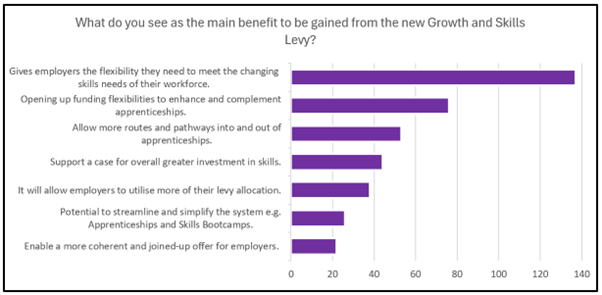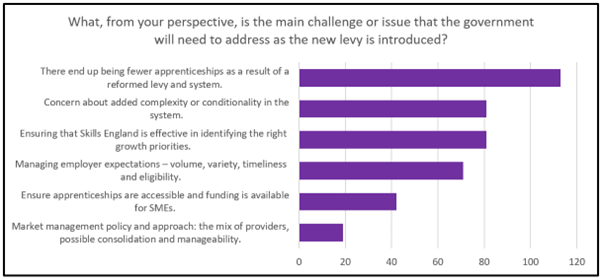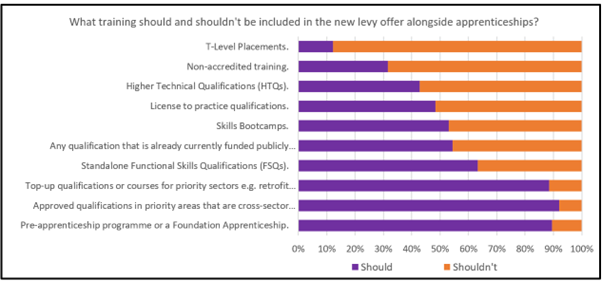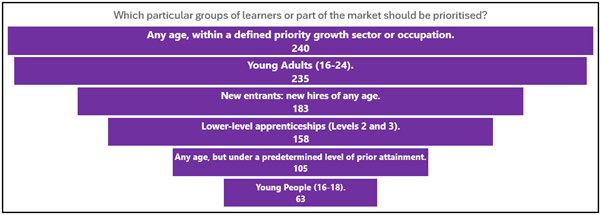Navigating the Future of Apprenticeships: Insights from the DfE Growth and Skills Levy Webinar

AELP recently co-hosted a webinar with the Department for Education (DfE) focusing on the forthcoming Growth and Skills Levy which was kindly sponsored by OneFile. With 500 attendees, it is clearly a topic that has sparked significant debate among industry professionals, educators, and policymakers. The discussion centred on the current state of the apprenticeship system in the UK, the challenges it faces, and the potential reforms that could make it more adaptable, inclusive, and efficient.
Key Concerns with the Current Apprenticeship System
Many of those who attended the webinar voiced several concerns regarding the existing apprenticeship system including:
- Complexity and Accessibility: The system’s complexity, especially regarding funding rules, was a major point of contention. Small and Medium-sized Enterprises (SMEs) often struggle to navigate the labyrinth of regulations, making it challenging to fully engage with apprenticeship programs.
- Quality and Relevance of Standards: There were discussions about the relevance and quality of apprenticeship standards, with a particular focus on ensuring that these pathways align with the rapidly evolving needs of industries, especially in the face of technological advancements like AI.
- Off-the-Job (OTJ) Training Requirements: The 20% OTJ training requirement was highlighted as a significant challenge, particularly for employers who find it difficult to release staff for such extensive training periods.
The Debate on Growth and Skills Development
The concept of “growth” in the context of apprenticeships was hotly debated. Some considered growth as simply increasing the number of apprenticeships, while others argued for a broader definition that includes improving workforce competency and aligning skills development with industry needs. It’s clear this is something the department are going to have to carefully consider when designing the new Growth and Skills Levy and what its parameters are within a squeezed financial envelope.
Inclusion and Stakeholder Engagement
Delegates in the webinar underscored the importance of involving a broad range of stakeholders in the conversation about apprenticeship reforms. There was a consensus on the need to support diverse groups, including learners with disabilities, economically disadvantaged individuals, and adults seeking to reskill. As well as this, ensuring the inclusion of professional bodies, SMEs, and micro-businesses in discussions about growth and skills development was seen as crucial for shaping relevant and effective apprenticeship standards.
This is an area that AELP will continue to highlight and be a voice calling for the need for meaningful stakeholder engagement. Through our longstanding relationship with DfE, we will look to hold further events that are open to the sector to support this because the voice of our members is so important.
Poll Results: Insights into Participant Priorities
During the webinar, participants were polled on various aspects related to the Growth and Skills Levy. The results expressed below are the views of the delegates and the results offer DfE significant insights into the collective priorities and concerns of the sector:
Main Benefits of the New Levy:
Most attendees believed the main benefit of the revised levy would be giving employers the flexibility they need to meet the changing skills needs of their workforce.

Main Challenges:
A real concern identified by attendees was the potential reduction in the number of apprenticeships due to a reformed levy system. A key priority to meet this challenge is to ensure that Skills England effectively identifies growth priorities and is responsive enough to enable providers to provide the training employers need. However, first employer expectations need to be managed as there were significant concerns about premature behaviour changes from employers because of unclear timeframes for any future flexibility/change to the levy.

Training Preferences:
Participants were divided on which training types should be included in the new levy offer. Pre-apprenticeship programs and Foundation Apprenticeships were among the most supported, while non-accredited training and T-Level placements were less favoured.

Prioritisation of levy funding
Ultimately our mission remains to advocate for a bigger slice of the budget in the upcoming spending review however it needs to be recognised that this may not be feasible due to the current economic climate.

Priorities for Apprenticeship Improvements:
The top priority highlighted by attendees was changes to the current Functional Skills Qualifications (FSQ) policy, followed by calls for further flexibilities in OTJ training requirements and a simplified approach to End Point Assessment (EPA). None of these are likely to come as a surprise for those involved within apprenticeship provision as these are areas that AELP and others have been campaigning for changes too for many years.

Conclusion: Moving Forward with Reforms
The DfE webinar on the Growth and Skills Levy highlighted both the challenges and opportunities within the current apprenticeship system. The discussions underscored the need for reforms that prioritize flexibility, inclusivity, and alignment with industry needs. As the government considers these insights, the focus will likely be on creating a more adaptable apprenticeship system that can effectively respond to the evolving demands of the modern workforce.
Stay Tuned:
Future webinars and consultations are expected as the DfE continues to refine the Growth and Skills Levy and its impact on the apprenticeship landscape. Your continued engagement and feedback will be crucial in shaping these developments.
By Helen Cuthbert is AELP’s Policy and Stakeholder Manager











Responses